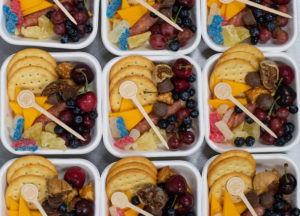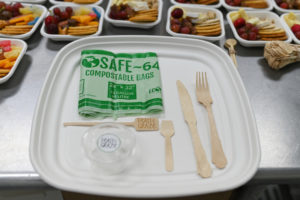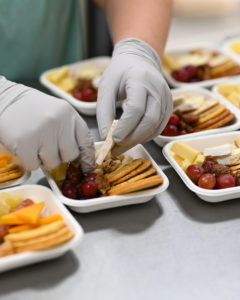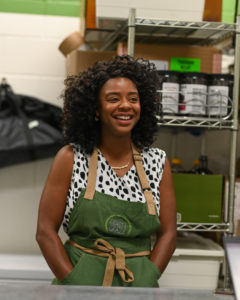
The writer of this PGF story is Laura Bonds.
The concept? Meat and cheese. The brainstorming and decision to create the company? Two hours. Feast and Graze, a charcuterie business whose owners are skilled in beautiful presentation of some of the most-loved foods, is all about aesthetic execution of their craft. Cristina McCarter and Tiffany Iriana Hofscher make their business seem simple; from the first conversation about Feast and Graze to their partnership with Project Green Fork, these female entrepreneurs could fool anyone into thinking running a business (even amidst a pandemic) is easy. But just as there is more to a charcuterie board than meat and cheese, there is a depth of business savvy they possess that might be overlooked at first glance.
When Cristina and Tiffany decided to go into business, they had an entrepreneur’s mindset: get this business off the ground and prove the concept can work. Once they established themselves and moved into a new kitchen space, they began thinking of how to develop their business and further its success. Enter Project Green Fork. And a pandemic.
Cristina and Tiffany were familiar with Project Green Fork, having worked in the food industry in Memphis with other businesses using Project Green Fork services. When they were approached by the company, they discovered how easy it could be to be sustainable, yet still have products that meet their visual standards. “We have to balance being cost effective with looking nice,” said Tiffany. “The shocker was it wasn’t expensive,” Cristina added.

Around the same time, the COVID-19 pandemic was impacting businesses, and supply chain delays were among the complications. This meant fulfillment of their regular containers was interrupted or made altogether impossible. When deliveries weren’t met, they decided to make the switch and put their creamy white cheeses and savory salamis on green packaging, packaging they knew was in lower demand and would be easier to get. To their surprise, the cost of this eco-friendly packaging wasn’t much different than what they had ordered previously. “It was as cost-effective for us, somehow,” Tiffany reflected.
While they found quick solutions to their supply chain concerns, they encountered additional obstacles, proving the entrepreneur life isn’t always as straightforward or as glamorous as it seems. They were able to obtain green packaging during the pandemic, but only trial and error led them to figure out what sustainable products were right for them. They tested container after container until they found what worked – products they could feel good about putting into the world and that looked as aesthetically pleasing as the finished plates themselves. Even now, once the preferred packaging has been selected, they face unexpected woes like container tops that warp in the hot Memphis summer. The women chuckled as they described their attempt at using compostable gloves. Those didn’t make the cut, but they’re glad they tried them out.

There are other challenges, too, in staying sustainably focused. It’s a “never-ending process,” Tiffany said, but it’s a worthwhile commitment to Cristina and Tiffany to recycle, compost and use local vendors. They’re proud to say they use 100% compostable packaging, apart from their wooden boards, which are reusable. When creating their dishes, they get creative with ways they can reuse the food scraps and only when they’ve thought of all options do they head for the garbage. “The last stop is the trashcan,” Cristina declared.
Switching to compostable serve ware made it easier to do outdoor events and community gatherings like the Central Gardens Association. “Having it already done meant we were able to say yes we can do it,” Tiffany shared, and “We got a quicker yes” from the event organizers too, Cristina confirmed. As more organizations require environmentally-mindful commodities, Cristina and Tiffany are confident Feast and Graze will be at the top of the list for event organizers by already using these products.

As Feast and Graze orders pick back up post-pandemic, especially as catering rebounds and new partnerships blossom, Cristina and Tiffany ask, “What can we do better?” Making it easy for their customers to feel good about the products they’re consuming is one way to carry their momentum forward. “If we can equip our customers to enjoy as seamlessly as possible with products that are compostable, that’s our ideal.”
For other like-minded entrepreneurs, they sympathize and know business owners are “focused on getting the job done and getting a profit.” But, Cristina counters, using products to feel good about is “also totally doable, especially now.” For those looking to get involved with Project Green Fork, Cristina and Tiffany want business owners to know the partnership is “not just an intimidating list of requirements, it’s a resource center and community of other businesses.”
Cristina and Tiffany continue to navigate the entrepreneurial world and make their way as competition crops up and new challenges are laid out. The entrepreneur hustle isn’t easy, but with compostable products there is one less hurdle to overcome and Cristina and Tiffany have more time to Feast and Graze.
